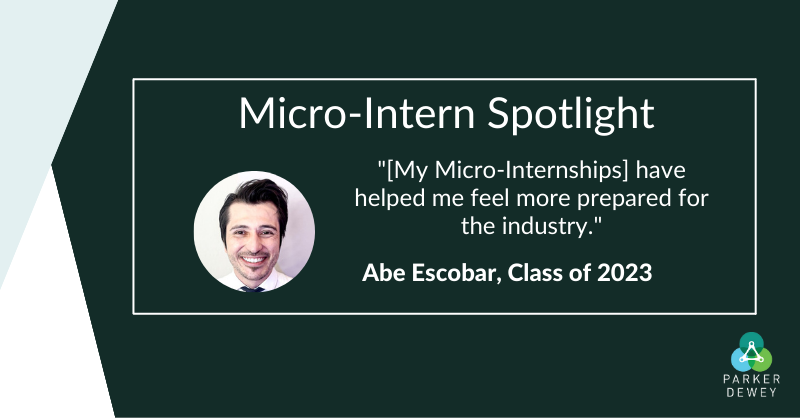.png)
Webinar Recap: Real Experiences, Real Relationships
“Everyone gets value, everyone gets utility.”
This sentiment encapsulates the mutually beneficial nature of Micro-Internships for both companies and students. As Micro-Internships rise in popularity, so do questions about their value and practicality in the workplace. In this webinar, panelists explored the avenues created by Micro-Internships that allow both students and companies to reach their respective goals.
Panelists include:- Cheyenne Boyce, Senior Program Manager for the Education Partner Program at HubSpot. HubSpot is a proponent of increasing job-readiness for students with hands-on experience offered through their platform.
- Russ Lyons, Head of Biomedical Education and Innovation at the Novartis Institutes for Biomedical Research. She advocates for integrated learning within workplaces and moderates the discussion.
- Dr. David Marshall, Professor and Chair of the Department of Strategic Communication in the School of Global Journalism and Communication at Morgan State University. Marshall offers the perspective of his students’ experiences with Micro-Internships.
- Jeffrey Moss, Founder and CEO at Parker Dewey. He offers firsthand perspective of the Micro-Internship model’s success across all industries.
Why HubSpot launched its Micro-Internship program
HubSpot is a leading digital company that offers a global CRM platform used across industries. HubSpot shares this digital marketing curriculum and training on its platform to education partners, but also looks to incorporate hands-on student learning in addition to offering access to their platform. After learning how Micro-Internships provide flexible, accessible work experience for college students nationwide, as well as on-demand support for busy professionals, HubSpot determined that this model would act as a catalyst for authentic relationships between students and professionals.
In discussing HubSpot’s success with Micro-Internships, Cheyenne shares, “The student is having this experience of being able to work on a project that is meaningful to the company, and the student is also doing work that the organization who is hiring doesn’t have time to do. They’re getting that work done, the student is getting experience, and everyone is a little bit happier. That, I think, is the overall benefit to the program.”
For companies, a key benefit of implementing Micro-Internships is the ability to complete high-priority projects that may not be the most valuable use of a professional’s time—know at Parker Dewey as “We should, but I shouldn’t” tasks. Smaller, yet important company tasks are completed by a student candidate who is eager for hands-on experience. Companies receive a high-quality result and the student receives experience within a workplace.
Cheyenne has worked with a Micro-Intern personally, and speaks highly of the experience. She says, “I needed help with a research project. I wear a lot of hats right now, I’m doing a lot of strategy around our programming, but I also needed some support looking at different HBCU’s that our program could provide support to. I ended up getting a great Micro-Intern. She presented a great research document, and it was really an overall value to our whole team.”
HubSpot is an example of how a company interacted with college students and added value to their organization using the Micro-Internship platform.
Similarly, Russ draws from her own experience hosting Micro-Internships and shares, “It is so easy to do. The financial burden is minimal. I started as the pilot, and have had such a great experience that we’re now going to see how we can create projects in lots of different areas within our research institute that can take advantage of this.”
How Micro-Internships help students gain experience and form professional relationships
From the student’s perspective, a Micro-Internship offers tangible experience outside of the classroom that supplements what is learned in college. David explains, “People are feeling that there’s this disconnect between what’s being taught in classes... and that students aren’t coming up with the types of skills that are needed to move the economy forward”. He emphasizes how university-taught skills can be used in conjunction with the knowledge students gain by interacting in a professional environment.
Additionally, students cultivate relationships with companies through Micro-Internships that can lead to possible future careers within that company. Cheyenne discusses this from a company’s point of view, saying, “We have hundreds of thousands of partners, and we are able to really improve the hiring effectiveness for those folks because they are getting to know the student who understands the ins-and outs of the company.”
As students explore potential career paths, they are searching for authentic experience that allows them to make a tangible impact within a company. The panelists agree on the importance to students that they build a real relationship with a company by adding genuine value to the team.
David explains, “It is the authenticity and the pipeline that the experience is going to lead to something…the experience is much more meaningful if students are involved in helping the company do what it's there to do. The closer we can get students to that piece, a little tiny piece of something that they can also show they're adding business value to the company, its mission, moving it forward, I think students really appreciate that because they see themselves in the larger scope of what the business is doing.”
TLDR: Micro-Internships help facilitate real relationships between students and companies—even beyond a short-term assignment. Interested in learning more? Schedule time with us.




